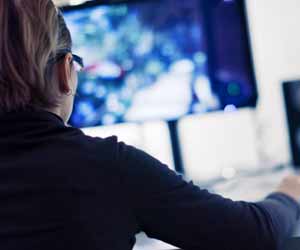Interview: Skills Video Game Designers Need
Nobody explains the true video game job experience like a seasoned pro! Check out our interview with a video game designer, who started in Quality Assurance (game-testing):
Q: What is your current position and what are the responsibilities associated with it?
A: I’m a designer, which, on my current project, means that I’m handed a simple idea for a stage of our game and am asked to fill in the details.
The ultimate goal is to take a simple idea that might not necessarily sound interesting and make it fun.

Once we have a design that sounds fun, we work with artists and programmers to get the details built into the game.
As the details are built we constantly re-evaluate what is fun or not and work towards the new goal.
Q: What educational courses or life experiences would you recommend to someone interested in becoming a video game designer?
A: There are several schools that are offering courses and even degrees related to video game development. The widespread accessibility of this type of education is relatively new, but we are already making a lot of hires from these types of programs. For designers, these programs often offer a wide variety of courses. Because designers are often the central figure in initiating and compiling the efforts of the other disciplines (programming and art) we are required to be somewhat familiar with both.
Being familiar with art from concepts to 3D modeling and animations helps tremendously when interacting with the art team. Being familiar with the logic and systems that the programmers build into the game is absolutely essential. The bottom line is, a degree in computer science and a working familiarity with a 3D modeling program such as Maya or 3D Studio Max are quickly becoming essential to be taken seriously.
Q: What skills would best serve someone interested in this career?
A: This is a tricky question since each and every studio has a different description of what a designer is. Even at our studio the designers on one project have very different responsibilities to those on other projects. There are a few things that stand out as must haves though. And these seem to be standard from studio to studio:
Great communication skills: No idea, no matter how great, will ever come to fruition if you can’t get it out of your head and into the heads of the dozens of other people that need to understand it.
Cooperative Skills: Game development is a process that rarely sees success without great teamwork.
A clear understanding of common game mechanics: It never fails that you will come across prospective designers and young designers that really have no clue what is going on in your average game, even the ones they play all the time. They get caught up in the illusion of the game and fail to see what is really going on. We are asked to make the illusions, so it is very important that we see through them. Take the time to write down and explain every single thing that takes place in your favorite game, every time a sound takes place, every time a character moves, shoots, drives, talks, etc… Once you have a couple of pages of info, try to reverse engineer what you just experienced. If you don’t understand what’s going on, ask your favorite veteran designer to explain it to you!
Flexibility: Even lead designers and executive producers have to be flexible with their designs. You have to realize that you aren’t the only one involved in making the game, and everyone needs to feel that they have contributed to more than just manpower. Keep in mind that you aren’t the only creative genius on the block.


 Teach English in Asia
Teach English in Asia  Cruise Ship Jobs
Cruise Ship Jobs  Alaska Fishing Industry Jobs
Alaska Fishing Industry Jobs  Sharing Economy / Gig Economy
Sharing Economy / Gig Economy